8-9 dec 22, international workshop “Colonial violence beyond the borders of empires”
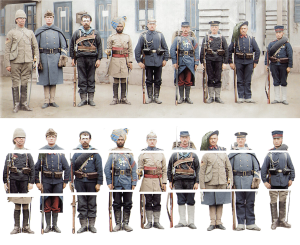
Troops of the Eight-Nation Alliance stand together during the Boxer War in China, 1900 (image adapted after a colourised photo by Julius Jääskeläinen, CC BY 2.0, https://commons.wikimedia.org/w/index.php?curid=91532070)
On 8-9 December 2022, the Centre, in cooperation with the University of Cologne, will hold an international workshop focussing on the topic of Colonial violence beyond the borders of empires: dis/connections, transfers, and mobilities, ca. 1850–1954.
In recent years, historians have increasingly sought to write imperial history beyond the borders of individual, ‘national’ empires. Such transimperial histories have had an impact on several research fields. However, this approach has been far less applied to one crucial aspect of colonial rule: violence. More than a decade ago, Robert Gerwarth and Stephan Malinowski postulated a common ‘Western’ ‘colonial archive’ on violence. We still know little about the exact forms this archive took, who contributed to it, how it might have been formed, and whether it was indeed as exclusively ‘Western’ as Gerwarth and Malinowski assumed. In this workshop, we would like to answer some of these questions and expand the field as a whole.
We strive to do so by addressing different aspects of transimperial connections concerning colonial violence. On a conceptual level, we need considerations on their specific nature, while, on an empirical level, case studies will assist in approaching the different dimensions in which these entanglements manifested themselves on the ground. Finally, contributions will also seek to complicate the notion of connectivity itself. One of our hypotheses is that colonial violence presents a more complex field of connectivity than we might find in other transimperial histories. We aim at analysing points of disconnection, of absences, detours, misunderstandings, distortions, or creative/hybrid appropriations. We are interested in whether and how transimperial histories can change our view of the different theories of nationally specific colonial cultures of violence.
Covering a wide range of empires and European and non-European actors, papers will look among others at specific conflicts, epistemic structures, practices, cooperations, expert exchanges, ideals of masculinity and processes of remembrance that extended colonial violence beyond the borders of individual empires. The workshop will feature keynotes by Bernhard Schär (University of Lausanne) and Kim Wagner (Queen Mary University of London).
Please click HERE to download the programme and HERE for the conference report by Callie Wilkinson.Place & date: Munich, 8-9 December 2022
Language: English
Host institutions: Käte Hamburger Research Centre global dis:connect, Ludwig Maximilian University Munich; University of Cologne, Cologne
Organisers: Dominique Biehl (University of Basel, Basel), Ulrike Lindner (University of Cologne, Cologne), Tom Menger (Ludwig Maximilian University, Munich), Markus Wurzer (Max Planck Institute for Social Anthropology, Halle/Saale)
Venue: Käte Hamburger Research Centre global dis:connect, Maria-Theresia-Str. 21, 81675 Munich Continue Reading





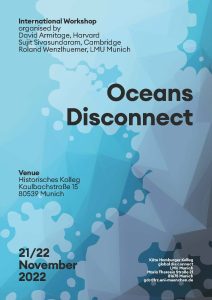
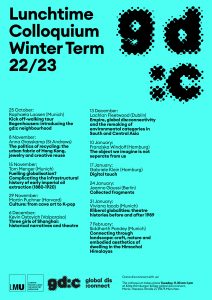 The lunchtime colloquium ("ltc") of the gd:c continues in the winter term. The first session will take place on 25 October. The colloquium takes place on Tuesdays from 11.30 am to 1 pm at the library of the Research Centre.
You can download the programme of the lunchtime colloquium
The lunchtime colloquium ("ltc") of the gd:c continues in the winter term. The first session will take place on 25 October. The colloquium takes place on Tuesdays from 11.30 am to 1 pm at the library of the Research Centre.
You can download the programme of the lunchtime colloquium 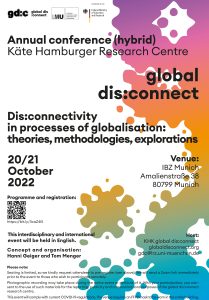 Dis:connectivity in processes of globalisation: theories, methodologies, explorations
gd:c annual conference (hybrid), 20-21 Oct 22
Dis:connectivity in processes of globalisation: theories, methodologies, explorations
gd:c annual conference (hybrid), 20-21 Oct 22

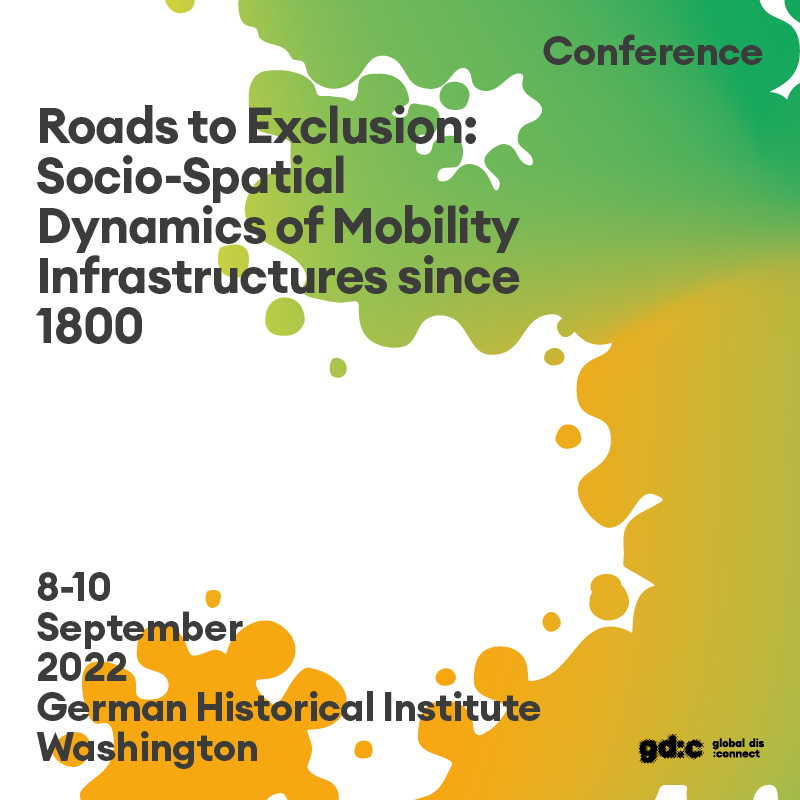 In September 2022, the international conference "Roads to Exclusion: Socio-Spatial Dynamics of Mobility Infrastructures since 1800" will take place at the GHI Washington. It aims to explore the (intended or unintended) dynamics of inclusion and exclusion entailed in mobility infrastructures, ranging from the nineteenth century to the present. The event is jointly organized by the German Historical Institute Washington within the framework of its research area “Histories of Mobilities and Migration” and global dis:connect.
The conference will take place from September 8–10, 2022 and will be hosted by the German Historical Institute in Washington D.C.
Please click
In September 2022, the international conference "Roads to Exclusion: Socio-Spatial Dynamics of Mobility Infrastructures since 1800" will take place at the GHI Washington. It aims to explore the (intended or unintended) dynamics of inclusion and exclusion entailed in mobility infrastructures, ranging from the nineteenth century to the present. The event is jointly organized by the German Historical Institute Washington within the framework of its research area “Histories of Mobilities and Migration” and global dis:connect.
The conference will take place from September 8–10, 2022 and will be hosted by the German Historical Institute in Washington D.C.
Please click 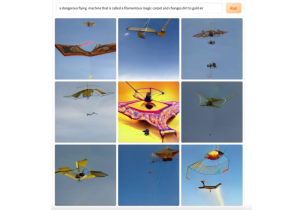 On 14 August 2022, the
On 14 August 2022, the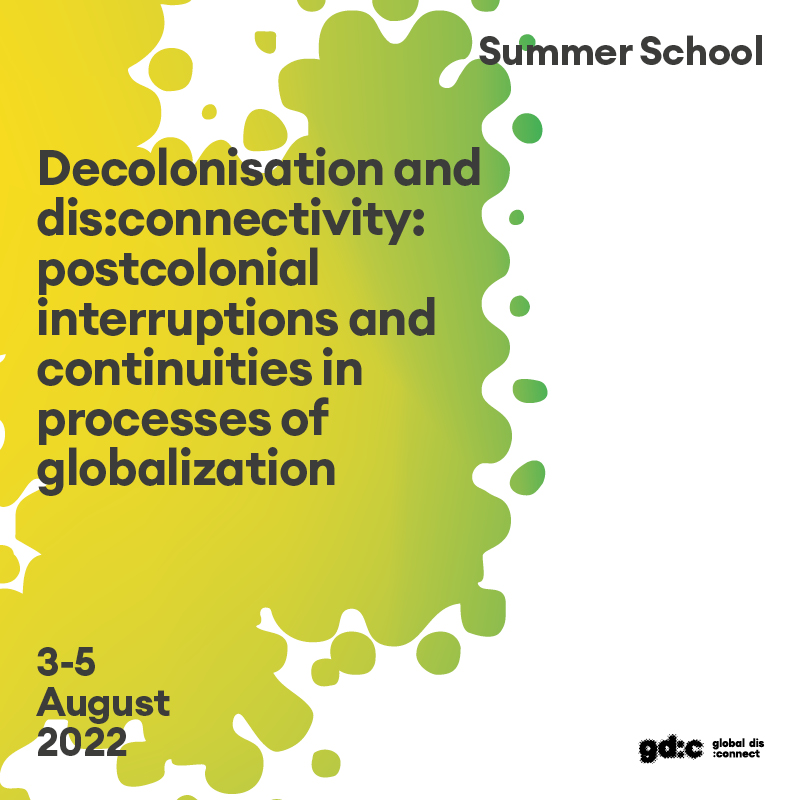 From 3 to 5 August the Käte Hamburger Kolleg global dis:connect will hold its first annual interdisciplinary Summer School at the premises of the center. This year, we will focus on Postcolonial interruptions? Decolonisation and global dis:connectivity and explore how dynamics of decolonisation reordered processes of globalization. We will ask how geopolitical alliances, economic networks, and cultural as well as epistemological bonds were questioned and interrupted permanently or temporarily and at the same time existing connections were reshaped, and new ones appeared. The Centre invites scholars and artists in early stages of their careers to discuss related projects with experts. The courses will foster dialogue between various scholarly approaches and artistic research.
Click
From 3 to 5 August the Käte Hamburger Kolleg global dis:connect will hold its first annual interdisciplinary Summer School at the premises of the center. This year, we will focus on Postcolonial interruptions? Decolonisation and global dis:connectivity and explore how dynamics of decolonisation reordered processes of globalization. We will ask how geopolitical alliances, economic networks, and cultural as well as epistemological bonds were questioned and interrupted permanently or temporarily and at the same time existing connections were reshaped, and new ones appeared. The Centre invites scholars and artists in early stages of their careers to discuss related projects with experts. The courses will foster dialogue between various scholarly approaches and artistic research.
Click 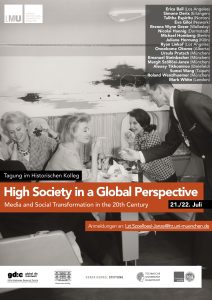 On 21 and 22 July 2022, the international conference "High Society in a Global Perspective. Media and Social Transformation in the 20th Century" will take place at the
On 21 and 22 July 2022, the international conference "High Society in a Global Perspective. Media and Social Transformation in the 20th Century" will take place at the 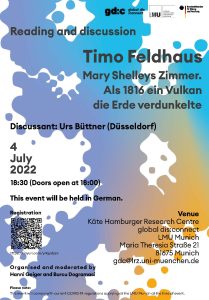 On 4 July, author and journalist Timo Feldhaus presented his book of historical fiction on the eruption of the Mount Tambora volcano (Sumbawa, modern Indonesia) in 1815. The eruption was the most powerful volcanic eruption in recorded history, and it induced climatic, social and artistic repercussions that affected the entire planet for years. Together with Urs Büttner, a scholar of literature, Feldhaus discussed the event as a moment of global rupture that demonstrates the dis:connections between the weather, climate and artistic production. For more information about the book click
On 4 July, author and journalist Timo Feldhaus presented his book of historical fiction on the eruption of the Mount Tambora volcano (Sumbawa, modern Indonesia) in 1815. The eruption was the most powerful volcanic eruption in recorded history, and it induced climatic, social and artistic repercussions that affected the entire planet for years. Together with Urs Büttner, a scholar of literature, Feldhaus discussed the event as a moment of global rupture that demonstrates the dis:connections between the weather, climate and artistic production. For more information about the book click